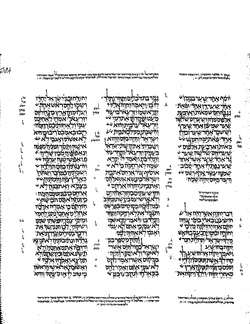Haggai 2
Haggai 2 is the second (and final) chapter of the Book of Haggai in the Hebrew Bible or the Old Testament of the Christian Bible.[1][2] This book contains the prophecies attributed to the prophet Haggai, written c. 520-515 BCE,[3] and is a part of the Book of the Twelve Minor Prophets.[4][5]
| Haggai 2 | |
|---|---|
 | |
| Book | Book of Haggai |
| Category | Nevi'im |
| Christian Bible part | Old Testament |
| Order in the Christian part | 37 |
Text
The original text was written in Hebrew language. This chapter is divided into 24 verses.
Textual witnesses
Some early manuscripts containing the text of this chapter in Hebrew are of the Masoretic Text tradition, which includes the Codex Cairensis (895), the Petersburg Codex of the Prophets (916), and Codex Leningradensis (1008).[6][lower-alpha 1] Fragments containing parts of this chapter in Hebrew were found among the Dead Sea Scrolls, including 4Q77 (4QXIIb; 150–125 BCE) with extant verses 2–4;[8][9][10] 4Q80 (4QXIIe; 75–50 BCE) with extant verses 1–2;[8][9][11] and Wadi Murabba'at Minor Prophets (Mur88; MurXIIProph; 75-100 CE) with extant verses 1–9, 11, 13–24.[9][12]
There is also a translation into Koine Greek known as the Septuagint, made in the last few centuries BCE. Extant ancient manuscripts of the Septuagint version include Codex Vaticanus (B; B; 4th century), Codex Sinaiticus (S; BHK: S; 4th century), Codex Alexandrinus (A; A; 5th century) and Codex Marchalianus (Q; Q; 6th century).[13]
Take Courage! (2:1–9)
The prophecy in this part was spoken almost a month after Haggai's last utterance to the same public: Zerubbabel, Joshua, and the remnant, using a similar interrogative rhetoric as in 1:4, 9.[14]
Verse 1
- In the seventh month, on the twenty-first of the month, the word of the Lord came by Haggai the prophet, saying:[15]
The date is October 17, 520 BC in current calendar calculation. In the ancient Jewish calendar this day was the last day of Sukkot (the Feast of Tabernacles; see Leviticus 23:33-44).[16]
Holy–Unclean (2:10–14)
Haggai speaks again as prophet a little more than two months later to the priests only.[14] Haggai asks for a priestly ruling (tora), which was one of the basic tasks of priests (cf. Deuteronomy 33:10; Leviticus 10:10-11) whether a certain action is holy (verse 12) and then whether another action is unclean (verse 13), to be connected to the condition of the people who at that time were worshipping at the temple site, which had been profaned (so it is unclean), thus without the purification of that holy place, all that the people of Judah offered were also unclean.[14] The solution of the problem would be the rebuilding the temple, because it involves rituals of purification (Haggai 2:15-19).[14]
Verse 10
- On the twenty-fourth day of the ninth month, in the second year of Darius, the word of the Lord came by Haggai the prophet, saying,[17]
The date is December 24, 520 BCE in Julian calendar; or December 18, 520 BCE in Gregorian calendar calculation.[16]
Verse 12
- [Haggai asked:] "'If someone carries holy meat in the fold of his garment and touches with his fold bread or stew or wine or oil or any kind of food, does it become holy?'"
- The priests answered and said, “No.”[18]
Verse 13
- Then Haggai said, "If someone who is unclean by contact with a dead body touches any of these, does it become unclean?"
- The priests answered and said, "It does become unclean."[19]
See also
- Darius I
- Joshua, son of Jehozadak
- Months in ancient Hebrew calendar: the seventh, the ninth
- Old Testament messianic prophecies quoted in the New Testament
- Zerubbabel, son of Shealtiel
- Related Bible parts: Ezra 3, Ezra 4, Ezra 5, Ezra 6, Nehemiah 7, Zechariah 1
Notes
- Since 1947 the whole book is missing from Aleppo Codex.[7]
References
- Collins 2014.
- Hayes 2015.
- Petersen 2007, p. 607.
- Metzger, Bruce M., et al. The Oxford Companion to the Bible. New York: Oxford University Press, 1993.
- Keck, Leander E. 1996. The New Interpreter's Bible: Volume: VII. Nashville: Abingdon.
- Würthwein 1995, pp. 35-37.
- P. W. Skehan (2003), "BIBLE (TEXTS)", New Catholic Encyclopedia, 2 (2nd ed.), Gale, pp. 355–362
- Ulrich 2010, p. 619.
- Dead sea scrolls - Zephaniah
- Fitzmyer 2008, p. 38.
- Fitzmyer 2008, p. 39.
- Fitzmyer 2008, pp. 140-141.
- Würthwein 1995, pp. 73-74.
- Petersen 2007, p. 609.
- Haggai 2:1 NKJV
- The Nelson Study Bible. Thomas Nelson, Inc. 1997. ISBN 9780840715999. pp. 1514-5.
- Haggai 2:10 KJV
- Haggai 2:10 ESV
- Haggai 2:13 ESV
Sources
- Collins, John J. (2014). Introduction to the Hebrew Scriptures. Fortress Press. ISBN 9781451469233.CS1 maint: ref=harv (link)
- Fitzmyer, Joseph A. (2008). A Guide to the Dead Sea Scrolls and Related Literature. Grand Rapids, MI: William B. Eerdmans Publishing Company. ISBN 9780802862419.CS1 maint: ref=harv (link)
- Hayes, Christine (2015). Introduction to the Bible. Yale University Press. ISBN 0300188277.CS1 maint: ref=harv (link)
- Petersen, D. L. (2007). "36. Haggai". In Barton, John; Muddiman, John (eds.). The Oxford Bible Commentary (first (paperback) ed.). Oxford University Press. pp. 607–610. ISBN 978-0199277186. Retrieved February 6, 2019.
- Ulrich, Eugene, ed. (2010). The Biblical Qumran Scrolls: Transcriptions and Textual Variants. Brill.CS1 maint: ref=harv (link)
- Würthwein, Ernst (1995). The Text of the Old Testament. Translated by Rhodes, Erroll F. Grand Rapids, MI: Wm. B. Eerdmans. ISBN 0-8028-0788-7. Retrieved January 26, 2019.
External links
| Wikisource has original text related to this article: |
| Look up Haggai in Wiktionary, the free dictionary. |
- Jewish translations:
- Chaggai – Haggai (Judaica Press) translation with Rashi's commentary at Chabad.org
- Christian translations:
- Online Bible at GospelHall.org (ESV, KJV, Darby, American Standard Version, Bible in Basic English)
